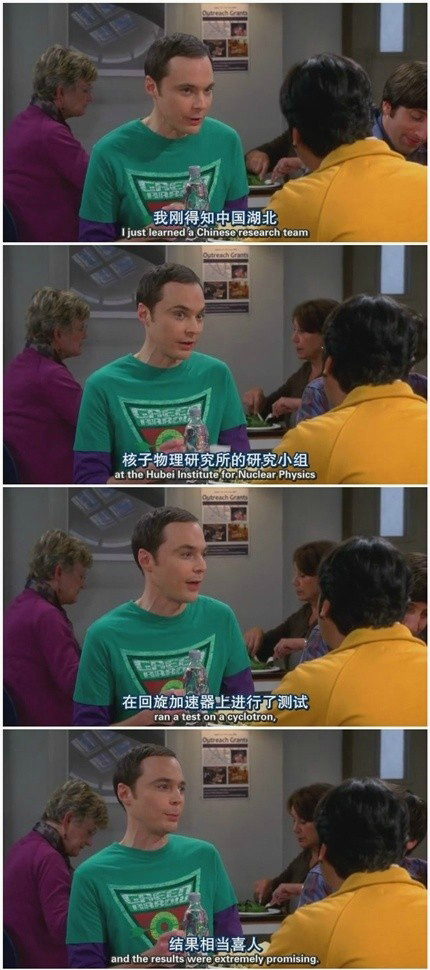Fun or bias? American TV series and China humor
- By Zhang Rui
 0 Comment(s)
0 Comment(s) Print
Print E-mail China.org.cn, December 18, 2013
E-mail China.org.cn, December 18, 2013
The American TV industry is no stranger to mockery. It just uses people's set ideas, or prejudices, towards a certain race or group of people to make fun of them. Chinese people often form a target in this way. Let's take a look at some prime examples.
In the latest installment of popular TV series "The Big Bang Theory" (CBS), Sheldon Lee Cooper Ph.D claimed he had discovered a method for synthesizing a new stable super-heavy element. Despite the fact that a Chinese research team at the Hubei Institute for Nuclear Physics ran a test on a cyclotron with extremely promising results and later found the element, his calculations proved wrong. This may imply the issue of China's academic credibility.
In one episode of "Agents of S.H.I.E.L.D." (ABC), agent Phil Coulson talks to former agent Akela Amador about how she was held in a cage inside a copper mine in Shanxi Province, China. The embarrassing Shanxi mines reference caused heated discussion among Chinese audiences.
American TV series usually portray Asian people in a stiff or exaggerated manner. In Fox's new sitcom "Dads," Crawford (Martin Mull) refers to Asian people as "Orientals," and when he learns that his son Warner has a meeting with Chinese investors, he insists, "The Chinese are a lovely and honorable people, but you can't trust 'em. There's a reason ‘Shanghai' is a verb."
The line was considered racist and was later protested against by the Asian and Chinese communities. "This is a show that will be evocative and will poke fun at stereotypes and bigotries -- sometimes through over-the-top, ridiculous situations," Fox Entertainment Chairman Kevin Reilly and COO Joe Earley wrote in a statement. In the recent blockbuster "The Wolverine," the Japanese samurai was contemptuously referred to as "little man."
Mahjong, Pai gow, ghost marriage and other ancient or corrupt China traditions from time to time will appear in American TV series or films. In "Bones" (Fox), there was a plot describing a Chinese-American dies without ever having married, so his family kill a girl to accompany him in the after-life and bury them together as a "ghost marriage," indicating China's superstitious beliefs.
There are many low-class Chinese characters that appear on American TV series as workers, waiters, maids or even as slaves and illegal immigrants. In "Grey's Anatomy" (ABC), one illegal female Chinese immigrant and her daughter are injured, but refuse to come into hospital.
Besides the lower-level characters, more and more Chinese elites also get a cameo on American TV series. Yet for Americans, Chinese people's desire for success is simply one step too far and sometimes those Chinese elites will appear to employ rather strange strategies to achieve just that. In "Friends" (NBC), Chandler's boss has a habit of slapping others' butts. While Chandler dislikes it, his Chinese colleague caters for his boss' habit.
In American TV series and movies, no matter if it's from earlier hit series like "Friends," "Lost," "Sex and the City," and "Prison Break," to current "The Big Bang Theory," "Elementary" and "Nikita," as well as movies like "The Wolverine" and the "Fast & Furious" series, Chinese and Asian people are often portrayed and labeled in unpleasant ways such as being rude, lazy and opportunistic with small eyes, a flat face and single eyelids. Other minority races in American TV series and movies are also the target of, sometimes even racist, mockery. Drug dealers are usually Mexicans and Russians are usually mobs and pimps. In "2 Broke Girls," South Korean restaurant boss Han Lee is a short man and gets mocked in many episodes for his stature and sexual ability.
This type of mockery is widely recognizable in American TV series. Aside from Asians, other races and nations, including the U.S. itself, get mocked – right down to their presidents.
It's a matter of cultural difference. It is known in the industry that a cultural clash is a good way to get audiences laughing and American producers want to please their own domestic viewers. It's okay to have fun, but should it always be at the constant and unfair expense of other races? If filmmakers cross a certain line, while the foreign communities don't understand the humor and culture and hence take it seriously, there most certainly is a problem.







Go to Forum >>0 Comment(s)